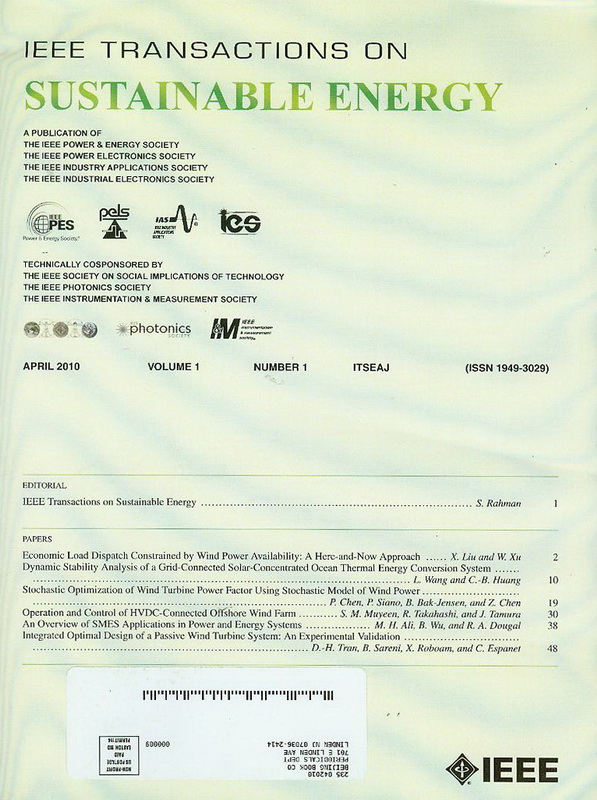Tube-Based Linear Parameter-Varying Model Predictive Control for Wind Energy Conversion Systems
IF 10
1区 工程技术
Q1 ENERGY & FUELS
引用次数: 0
Abstract
Maximum power extraction and transfer from wind energy conversion systems (WECS) to the power grid depends on a high-performance control system. This paper proposes a robust tube-based linear parameter-varying (LPV) model predictive controller (MPC) for rotor speed and stator's active and reactive power control of a Doubly-Fed Induction Generator (DFIG) based WECS. The turbine dynamics and the DFIG is modeled as a single LPV system, which enables the model transformation into an equivalent linear time-invariant (LTI) system to avoid online updates of the prediction matrix. Based on the LTI representation, a tube-based LPV MPC (TLPVMPC) is developed, consisting of a tracking nominal MPC with tightened constraint sets and a disturbance controller. In the proposed method, the disturbance upper bound is estimated by Kalman filtering, which provides less conservative performance. The proposed controller is compared to sliding mode control (SMC), LPVMPC and nonlinear MPC (NMPC) methods. Simulations are conducted under model uncertainties and partial faults in the DFIG control voltages. The results show the robust performance of the proposed controller in power extraction and reduction of mechanical stress build-up compared to the other control methods.基于管道的风电转换系统线性变参数模型预测控制
从风能转换系统(WECS)到电网的最大功率提取和传输取决于高性能的控制系统。针对双馈异步发电机(DFIG)的转子转速和定子有功、无功功率控制,提出了一种鲁棒的线性变参数模型预测控制器(MPC)。将汽轮机动力学和DFIG建模为单个LPV系统,使模型转换为等效线性时不变(LTI)系统,避免了预测矩阵的在线更新。在LTI表示的基础上,提出了一种基于管状的LPVMPC (TLPVMPC),它由一个带紧约束集的跟踪标称MPC和一个扰动控制器组成。该方法采用卡尔曼滤波估计扰动上界,具有较小的保守性。将该控制器与滑模控制(SMC)、LPVMPC和非线性MPC (NMPC)方法进行了比较。在模型不确定和DFIG控制电压部分故障的情况下进行了仿真。结果表明,与其他控制方法相比,所提出的控制器在功率提取和减少机械应力积累方面具有鲁棒性。
本文章由计算机程序翻译,如有差异,请以英文原文为准。
求助全文
约1分钟内获得全文
求助全文
来源期刊

IEEE Transactions on Sustainable Energy
ENERGY & FUELS-ENGINEERING, ELECTRICAL & ELECTRONIC
CiteScore
21.40
自引率
5.70%
发文量
215
审稿时长
5 months
期刊介绍:
The IEEE Transactions on Sustainable Energy serves as a pivotal platform for sharing groundbreaking research findings on sustainable energy systems, with a focus on their seamless integration into power transmission and/or distribution grids. The journal showcases original research spanning the design, implementation, grid-integration, and control of sustainable energy technologies and systems. Additionally, the Transactions warmly welcomes manuscripts addressing the design, implementation, and evaluation of power systems influenced by sustainable energy systems and devices.
 求助内容:
求助内容: 应助结果提醒方式:
应助结果提醒方式:


